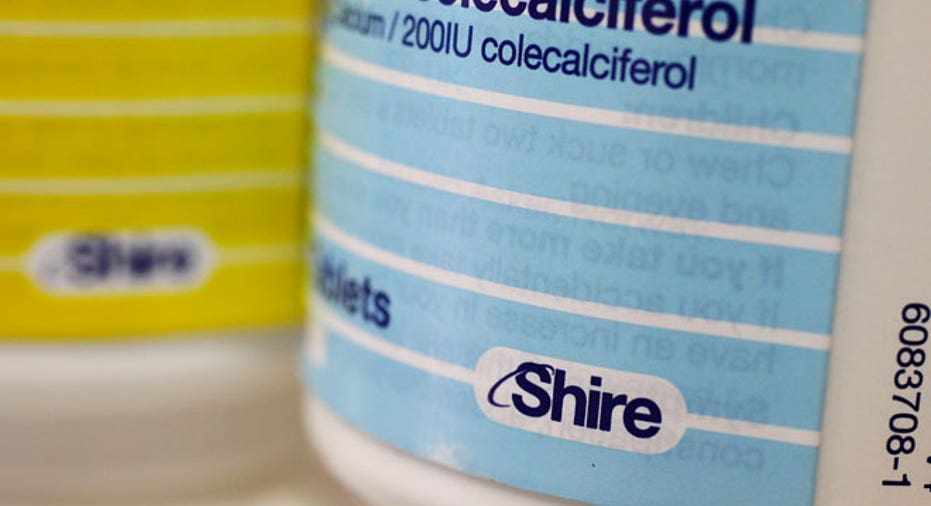Will Congress Scuttle the AbbVie-Shire Merger?

AbbVie’s (NYSE:ABBV) $54 billion proposal to acquire Irish drug maker Shire (NASDAQ:SHPG) would mark the largest tax inversion ever, as a growing number of U.S. companies pursue lower rates overseas.
After months of courtship and four offers, AbbVie sealed the deal on Friday to buy Shire and pave the way for the Chicago-based drug firm to become domiciled in the U.K., Shire’s current tax home. But American companies seeking friendlier tax policies are attracting more scrutiny from the Obama administration and Capitol Hill of late, given the industry’s string of inversion deals this year.
Just this week, Mylan (NASDAQ:MYL) agreed to pay $5.3 billion for Abbott Laboratories’ (NYSE:ABT) generic drug business. The new company will be incorporated in the Netherlands.
In June, medical device maker Medtronic (NYSE:MDT) announced a deal to buy rival Covidien (NYSE:COV) for $42.9 billion. The transaction sets up a tax move to Ireland, which is often the center of tax inversions thanks to the country’s comparatively low corporate tax rate of 12.5%.
Pfizer (NYSE:PFE) made an unsuccessful attempt to secure a tax inversion through a $118 billion buyout of U.K.-based AstraZeneca (NYSE:AZN). The bid, which was dropped in May, would have created the world’s largest pharmaceutical company.
The U.S. has a federal corporate tax rate of 35%, while the U.K.’s main corporate rate is 21%.
Treasury Secretary Jack Lew recently sent a letter to congressional tax-writing committees to request legislation that prevents companies from leaving U.S. tax bills behind, retroactive to May 2014.
“We should prevent companies from effectively renouncing their citizenship to get out of paying taxes,” Lew wrote.
Lew endorsed legislation proposed by congressional Democrats. The Joint Committee on Taxation, a non-partisan congressional panel, estimates the bill will allow the Treasury to maintain $19.5 billion in tax revenue over the next 10 years.
Republicans have also voiced concern over the trend, but lawmakers on the GOP side believe the deals signal a bigger issue with the nation’s tax code. Sen. Orrin Hatch (R-Utah), the top Republican on the Senate Finance Committee, responded with his own letter to Lew, saying the administration’s method of addressing tax inversions would amount to “constructing a wall” around American businesses.
However, Hatch left the door open to short-term steps that Congress can take “to address corporate inversions and related issues” until an agreement on comprehensive tax reform can be reached.
“The debate would be more appropriately shifted toward tax reform and making companies more competitive in the global economy we operate in,” AbbVie chairman and chief executive Richard Gonzalez said during a conference call with analysts. “Today we’re at a disadvantage. That’s the important debate we should be having.”
Investors are staying cautious. Shire’s U.S. shares were trading 1.6% higher at $257.50, below AbbVie’s offer of roughly $259 a share. But with D.C. still working on an approach to tax inversions, deals like AbbVie’s pending acquisition of Shire appear safe from political roadblocks for now.
“The problem is Democrats want to do something specific to [tax inversions]. Republicans say you’re putting companies in a bind because they’re not competitive. They want broader tax reform,” Sanford Bernstein analyst Ronny Gal said.
Sen. Hatch’s letter raises the odds of a legislative fix, but only slightly. “We moved from a 1% chance to maybe a 20% chance,” Gal remarked.
Unlike Medtronic’s proposal to combine with Covidien, AbbVie will be required to cover a break-up fee of up to $1.6 billion even if it chooses to walk away from the Shire acquisition because of changes to U.S. tax laws. Medtronic retains an option to abandon its deal if policymakers block tax inversions.
Gonzalez noted that AbbVie believes the deal is “highly executable.” AbbVie, which projects its overall tax rate will drop from 22% to 13% by 2016, is expecting the transaction to close during the fourth quarter of 2014.
‘Strategic Rationale’
Beyond tax inversions, the pharmaceutical sector has been driven toward consolidation amid an influx of generic drugs entering the market. Companies are seeking to replenish their pipelines of new treatments, as generics take a bite out of brand-name drugs.
For instance, Pfizer’s sales have suffered from the expiration of patents for Lipitor and other drugs. Pfizer booked a 6% decline in revenue last year.
Gonzalez stressed that achieving a lower tax rate wasn’t the company’s primary motivation to secure a deal with Shire. AbbVie wouldn’t do the deal if it was solely about taxes, he said.
Analysts have said AbbVie, which was spun off by Abbott Laboratories (NYSE:ABT) last year, will benefit from diversifying its portfolio of drugs. The company currently relies heavily on rheumatoid-arthritis treatment Humira, the best-selling drug worldwide. Humira generates more than half of AbbVie’s sales.
The addition of Shire “would diversify AbbVie's product portfolio away from Humira for autoimmune diseases with the addition of strong drugs for neuroscience indications and rare diseases,” Morningstar analyst Damien Conover wrote in a research note to clients.
By purchasing Shire, AbbVie will broaden its portfolio to include treatments for attention deficit hyperactivity disorder, such as Adderall, and rare diseases. AbbVie has already increased spending on research and development to pursue late-stage treatments for cancer, hepatitis C and multiple sclerosis.
Shire reported second-quarter results on Friday, unveiling revenue growth of 20% to $1.5 billion. The company cited higher sales of Vyvanse, another ADHD drug. Shire also saw increased demand for Cinryze, a treatment for a rare genetic disease called hereditary angioedema.



















